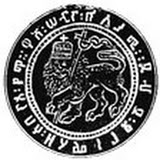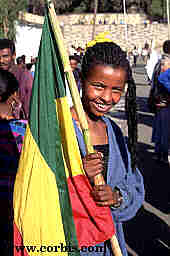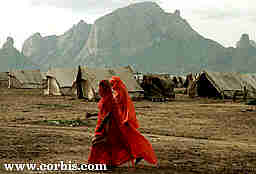Free Mail in your name
and your language
webmaster

GeoAlaska: Theatre & Film
 |
| Ethiopia: History & Cultures |
|
Free Mail in your name |
 |
| Ethiopia: History & Cultures |











1. Victim of Ethiopian Famine A young victim of the famine in Ethiopia struggles to recover under the car of a relief organization at a tented village in northern Somalia. (Bryn Colton; Assignments Photographers/Corbis PY001384) 2. Mother and Toddler Wait for Food in Ethiopia. Ethiopia and Sudan desert (Chris Rainier/Corbis CR002536) 3. Elvis Costello performs at the Live Aid Concert to benefit famine relief in Ethiopia. London, England, UK (Neal Preston/Corbis PN010039) 4. Famine An emaciated child sits, covered with flies, at a red cross refugee camp in Ethiopia during the famine of 1984-1985. (Chris Rainier/Corbis CR001332) 5. Bob Geldof sings with the Boomtown Rats at the Live Aid concert in Wembley Stadium. Geldof organized the event to raise funds for famine relief in Ethiopia. London, England, UK (Neal Preston/Corbis PN014818) 6. Refugees 7. USA: Protesting. 8. Two women refugees from Eritrea, Ethiopia, walk past a refugee camp in east Sudan dressed in traditional robes. (Peter Turnley/© Corbis TL001003) 9. Semi-nomadic Garris from southern Ethiopia prepare to leave Walde Refugee Camp, in northern Kenya, for the journey home. 1993. (Howard Davies/Corbis HD001745) 10. Refugee Camp A child sits on a bench at a refugee camp in Ethiopia during the famine of 1984-1985 which affected 150 million inhabitants of sub-Saharan Africa. (Chris Rainier/Corbis CR001614) 11. Man Kneeling in Barren Desert of Ethiopia. Ethiopia and Sudan desert. (Chris Rainier/Corbis CR002515)
We were married in Jerusalem in 1984. Our daughter was born in 1984. The article from New York Times is about Esther's fundraising for the famine. We flew to Jerusalem from New York on my 35th birthday. Below are my thoughts and notes from the diary. Part One.
APOCRYPHA
Old Books
There are many of them, hand-written books with pictures. There are in Ge'ez and not many today know this forgotten language. For a few dollars you can get a book, as a souvenir. To take through the customs office is another story. (Summer 1995)Since Ethiopians for centuries lived on their own, their bible stories, re-written so many times by the monks, had their own life. They had no scrutiny of European churches, and even in Ethiopian canonical sense they are loose. After all, each new bible was for one reader, a family. Finished in the monastery, the book would be taken away to some local court and would live its own long life. What if some unknown monk would add or replace the texts in the original? There were centuries of writing at the time when there were no writers of fiction.
Here is one their stories I wrote down after a translation by the old man with good English. The trial of Christ.
...And they led him unto Pilate. And Pilate sent them all away and asked him, Art thou the Christ? tell us. We heard others. I heard that you know the future. Tell me, why should I know my future? Go and see for yourself, I tell them. They say, you the past. But what would want to find there? What do I need to know about the past or the future? Tell me what I do not have? I have more than I can eat. More that I can desire. Too much is the name of life. I have to live slow to feel it.And Jesus answered him and said, Thou sayest it.
When Pilate questioned with him in many words;
They say you know everything. I am a Roman, I know things. But why should I know it all? I do not grow my food and do not bake my bread, I didn't built my house and didn't make my cloth, I have too much made for me to ask for fruits instead of being a gardener of my own thoughts. I need my answers not yours.But the Christ answered him nothing.
And the Pilate then said, thou teach that I shall live again. Tell us about resurrection. Without memory of my first life? I look at a child -- he is me, living without any memory of my life. Shall I re-live, remembering my first life? Did I forgot what is means to be young? Why would I ask for youth if I shall remember the old age?
But Jesus turning unto him, said, Thou know how to imagine things.
And Pilate answered, Your God offers me an immortal soul, but because I know how to feel, I ask you, Teacher, don't I have enough to understand in my long life? Why would I need the eternity? Am I a stone? What would i do with another fifty years of living? I have to be limited to have my life, to feel it and to value it.
And Jesus answered him and said, Thou sayest it.
And Plate said, I don't understand you and don't trust your generosity. I see a market trader in front of me. Why do you sell me what I do not need?
And Jesus answered him nothing.
And Pilate said, I heard of you, but I don't know you. I don't have feelings you have, I don't know your desires. You are like a man who never lived, who has no life and knows it. Are you dead already? Had you been a man? Art thou then the Son of God?
And he said, Ye say that I am.
Pilate thought deep and said, Why would I want to be God?
Even a half of God? Why shouldn't I be happy with being a man?
And Jesus said nothing.
Pilate was sad, You talk to people who have nothing to say. You're their teacher. Why can't you talk to men of great minds? Why didn't you come to me? I shall send you back where you came from. You are their man.And he said unto them, I have found no cause of death in him.
....
In the Old City you walk.
We went to see the place. It was a daytime, good day, sunny and hot. I saw nothing, just space, place and stones under the sun. We went back to the Jewish quarter where we stayed to read more....This man went unto Pilate, and begged the body of Jesus.
And Pilate asked Joseph, Art thou waiting for the kingdom of God? I know you are a good man, and a just, do not afraid to answer.
But Joseph can answer him and cried.
Pilate saw it and said, Why do cry, Joseph? Don't you believe your teacher? Don't you know remember his words? He is yours and you are his. Go and pray.And that day was the preparation, and the sabbath drew on...
....
Ethiopians are outsiders to everybody. They weren't Jews and the Romans never made that far into Africa. They accepted Christianity so early and easy without pressure or visible reasons as if it was their forgotten thought. They never had missionaries. They kept this religion for themselves and had no intentions of shaping their Orthodoxy into a concisive teaching. Their Christ is black. And their Mary is black. Even angels and Heavenly Father are black with huge dark eyes. Even the Romans are black on Ethiopian icons. The sun of Palestine is strong. They painted their scrolls at the time when the Renaissance introduced the riches of realism and optical perspective.
....
Pilate was alone:
What was different about this Jew? He claimed to be the Son of God, something from the Greek deep antiquity, the era of heroes. Who would believe in it in Rome? But there were problems with Roman gods. They were dead. The Romans had need for gods but the Romans ruled the world. Rome was the power and force.CONVERSATIONS WITH MARY
"So, he is God. Is that what they say?"Martha and Magdalene tried not to look at Mary.
"Do you understand it?"
"I listen to them talking," Martha said. "They talk and talk."
"I gave birth to him."
"They say what he say -- the Father, the Son, the Holy Ghost."
"Which one is my Jesus?"
"The Son."
"So you understand it. He won't die than."They gave no answer.
Childless Jesus, what could he know about life? He was a postmodern man, way ahead of his times, a bachelor, a New-Yorker...Man-God? There was no an adequate response to the radicalism of this modernity of thought. God as man! Wow!
What do you say?Shame on me! The failure of self-analysis, what else? The story, my narrative -- why the modern can't be rejected with the same force?
You, the poor mind, you don't know what is yours.
What's God's love? Not sexual? How about Mary?
Why would I like God to love me? Have you been in love? Did anybody love you? Do you know what you're talking about? And not "liking" -- but "love"? Not a mortal, but God's love?! Scary? Lord loves me even if I don't love him back? Did you experience it? Tell me how you feel. We know many stories about broken hearts. Why God's heart isn't broken? Why nobody killed himself over love to God? Did you see it? Look! "Jesus Loves You!" How does he do it? How do you express your love? I want to learn. I want to write poems. Jesus didn't. He wasn't artistic type. I don't understand it. not like his Father, the creator? Not in his image and likeness.I walked the streets of the city. I tried to walk into his Jerusalem. I walked into a small crowd around a man talking. I stopped and listen.
Have you ever try to talk outside, on the busy street to ten, twenty, fifty people? [In Ethiopia both Christian and Muslim priests use loudspeakers.]
He had to speak loud, he screamed. There was too much noise to hear him. you only could look at him. "What is he talking about?" I asked. "Who knows?" The busy people were busy, only the ones with nothing to do hanged around. I wanted to ask -- who is this man?
Is it a place to talk about important things? It was a hot day, too much sun for mystery of life and death. Why do you think we write, print and read books? What serious could be said at the corner? I rather read. And why would I talk to strangers? Unless I'm looking for votes.
The sweat was on his forehead. I walked away.
.... The walls. Walking through the gates. Damascus Gates. Remember the guards? Clean and empty. Nobody lives in Kremlin. How could I miss it? Why didn't I notice it? How can I be so blind? Dead Russian old city. A museum, place of a government? Why would the government want to be in a museum? Life is not alowed in Kremlin! Fake city? Pretence history?
Are they still waiting for Lenin's resurrection.
Dead heart of Moscow.Two Jews: Marx and Lion of Judah. You can find them both in Jerusalem. Old Jerusalem is a small city.
Images of Jerusalem are in Part Two. (Not posted) 